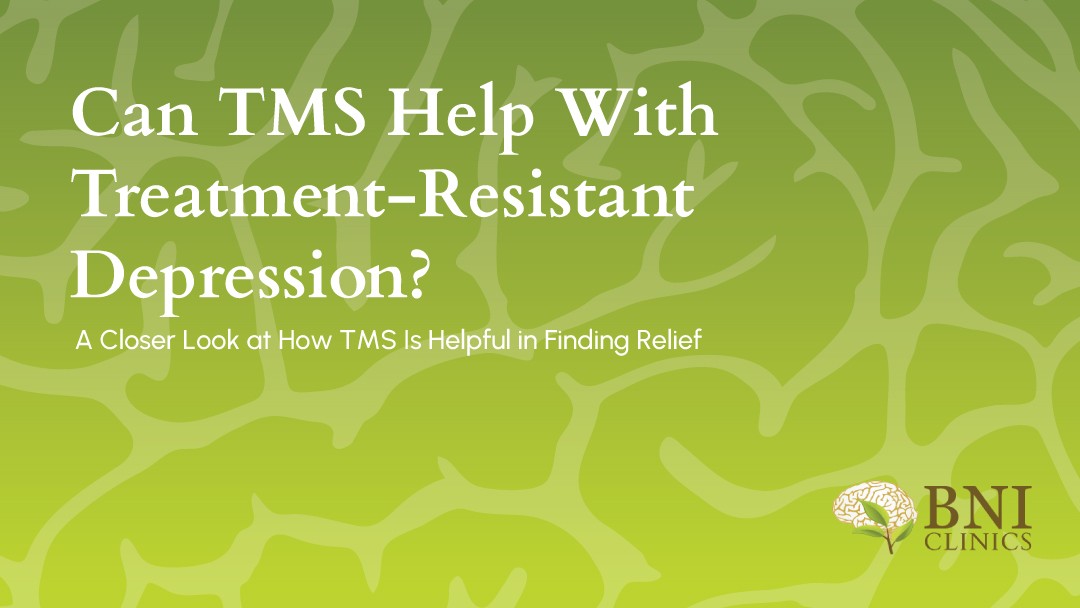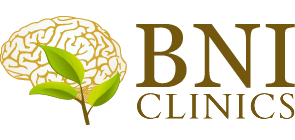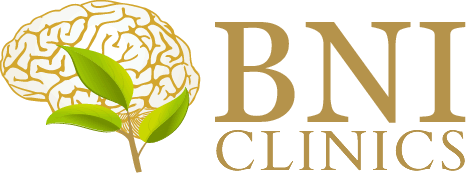Can TMS Help With Treatment-Resistant Depression? A Closer Look at How TMS Is Helpful in Finding Relief

Have you been experiencing depression that doesn’t seem to be going away and is impacting your ability to accomplish simple tasks? Does it feel like you have tried everything to treat this condition, but your symptoms are not getting better (and might even be getting worse)? You are not alone. Approximately 1 in 24 Californians face significant challenges in daily activities due to serious mental health conditions, like treatment-resistant depression.
At BNI Clinics, we are experts on transcranial magnetic stimulation (TMS), and we can answer any questions you might have about this procedure. Today, we will discuss one of the questions we get asked the most: “Can TMS help with treatment-resistant depression?”
Transcranial Magnetic Stimulation (TMS): What You Need to Know
TMS is a procedure approved by the U.S. Food and Drug Administration (FDA) that utilizes magnetic fields to activate specific nerve cells in the brain based on a person’s specific needs. This is done through the use of electromagnetic coils that are placed against the scalp. The stimulation this provides helps alleviate symptoms of depression and other different conditions. As a non-invasive approach that does not involve surgery, it serves as a viable option for individuals who have not responded well to traditional treatment methods.
While TMS is primarily used to treat treatment-resistant depression, it has also been known to help people with other conditions, such as:
- Epilepsy
- Obsessive-compulsive disorder (OCD)
- Migraines
- People who want to stop smoking
When Other Treatments Haven’t Worked: How TMS Can Help
When areas of the brain, such as the areas responsible for regulating mood, are stimulated, the firing patterns of the nerves can be altered. These nerves tend to be less active when someone has this condition. When TMS stimulates them, it can cause improvements in a person’s depression symptoms.
In a 2023 study, 46.8% of treatment-resistant depression participants experienced improvements in their symptoms during an acute treatment phase lasting between 4 and 6 weeks. The study also found that 30.5% achieved remission. These findings aligned similarly to previous studies, indicating that TMS can be a significant tool for finding relief from symptoms when other methods have been less effective.
TMS Alleviates Many Symptoms of Depression: How Does It Do This?
TMS has been known to help reduce many symptoms of depression that result in someone having a decreased quality of life. One of the most prominent symptoms it helps with is suicidal ideation. In a study from 2022, researchers found that the participants who received TMS by itself and TMS in combination with antidepressants both had a significant reduction in suicidal thoughts. However, the TMS that was combined with antidepressants had a larger effect than TMS performed by itself. The study also showed that people who received more than 10 treatment sessions had a significant reduction in suicidal thoughts than those who had less.
Another 2022 study found that TMS showed significant improvements in mood, somatic, and insomnia-related symptoms in two large TMS clinical trials. This showed that not only is this procedure great for helping manage more crisis-like symptoms of depression, but it can also result in improvements in other typical depression-related symptoms.
Exploring the Benefits of TMS for Treatment-Resistant Depression
TMS is highly effective when treating depression. In a 2023 UCLA study, they found that 54% of participants showed at least 50% improvement in their mood symptoms after having weekly TMS treatment. For individuals who have felt like they have tried everything else, this can be a safe and efficient way to get their life back.
While depression is a curable condition, for some people, it might not feel that way. Perhaps they have tried multiple antidepressants, various types of therapies, and any other trick they have found or been told about, but their depression continues to persist. For many of those people, TMS helps them in ways that traditional methods never did. When TMS is combined with antidepressants, the effectiveness is even more improved, especially for treatment-resistant and refractory depression. This might be because TMS allows the brain to be more receptive to these treatment options.
Personalized TMS Care at BNI Clinics in Agoura Hills, CA
If you have been experiencing depression symptoms that haven’t seemed to go away with any traditional methods your doctors have suggested, TMS therapy might be the right option for you. This safe and effective treatment option might be the tool you need to find healing.
BNI Clinics is located in the Los Angeles area and provides safe and effective mental health treatments like TMS for children and adults. Our team is clinician-led and ensures that each client has the tools they need that will provide them with long-term healing outcomes. To find out if you might benefit from TMS treatment, call us at (310) 691-5005.
BNI Clinics: Science-based, evidence-backed, compassion-led.



